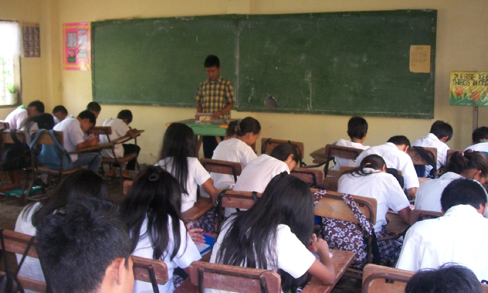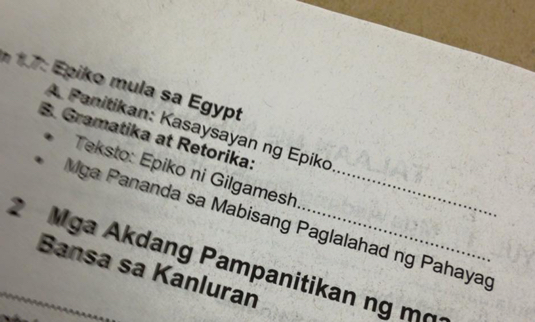
An administration solon has called on for an investigation over recent cases of “sick books” published by the Department of Education (DepEd), after a self-styled crusader revealed that a textbook for 10th graders contains 1,300 errors.
Valenzuela City Congressman Win Gatchalian, a majority member of House Committees on Basic Education and Culture and on Higher and Technical Education, maintained that allowing textbooks with errors to be used by teacher and students amounts to mismanagement of taxpayers’ money.
“DepEd should conduct a comprehensive review of all their textbooks and learning materials. Having errors in books is tantamount to wasting scarce public funds on useless and humiliating learning materials. We need a law penalizing those responsible for the errors in school books, including government officials,” said Gatchalian.
Related News: DepEd blasted for 16M obsolete textbooks for public elementary schools
National People’s Coalition (NPC) Congressman Gatchalian pointed out that erroneous books are detrimental to the intellectual growth of students: “If the DepEd is really committed to making the student population globally competitive, textbooks for students and teachers should have no room for errors.”
“A textbook mistake does not only affect one generation of students but also future ones, creating a vicious cycle of ignorance. Such cycle could have been prevented if only the concerned officials and employees were performing their jobs excellently,” he said.
The Grade 10 English textbook in question is titled “Diversity: Celebrating Multiculturism (sic) through World Literature,” which Antonio Calipjo Go, academic supervisor at Marian School of Quezon City, said is “shadowed by a penumbra of infirmities, inconsistencies, deficiencies, defects, and instances of plain stupidity.”
Education Secretary Armin Luistro claimed the 508-page book, obtained by Go from two public school teachers who attended DepEd’s May 15 National Training on Trainers, is only the first draft. Education Undersecretary Dina Ocampo, on the other hand, said in a Facebook post that the version was used for training only.
But the Valenzuela City representative does not buy the explanation of the DepEd on the erroneous textbooks as he maintained that sanctions should be meted out to responsible officials and employees while publishing houses behind erroneous books should be blacklisted.
Related News: Gatchalian urges DepEd, CHED to spearhead info drive for ‘K to 12′
“Transformative change in the procurement and evaluation of books is not an easy process and cannot be done overnight, given that major and minor errors in books have been appearing for more than a decade now. And the DepEd should do the right thing even if it means firing a lot of people, even those in the upper echelons,” said Gatchalian.
“The procurement of textbooks is a multi-million business, but beyond profits, it is a public service that should be free of corruption. I believe that under Bro. Luistro’s leadership, this very urgent change can be done, especially now that the K to 12 program is being implemented to improve the quality of our students.”

The DepEd earlier admitted that there was an “editorial lapse” in the Grade 10 textbook “Filipino: Panitikang Pandaigdig.” Photos of two pages from the said book spread like wildfire on social media because it incorrectly stated that “Harry Potter” is a novel from the United States and that the Epic of Gilgamesh is from Egypt.
Before a textbook gets into the hands of students, it is first screened by an expert on the subject who would then send the material back to DepEd for review. After the DepEd’s review, the book is delivered to an institution like a university. To avoid textbook mistakes, which Luistro says are errors by publishers, the DepEd gets its own authors and thus owns all learner modules.
Gatchalian urged the DepEd to revisit their evaluation system and to shape it up as errors still appear in public textbooks.”Clearly, the DepEd’s current system of evaluation to check against factual and grammatical errors is ineffective because textbook errors still persist. Textbooks and manuals should only be printed if and only if they contain no error. A single mistake is one too many,” he said.
UP Professor Maria Serena Diokno previously slammed DepEd’s flawed system of evaluating public school textbooks which allows books to get a perfect grade even if it has three major errors, showed a media report. Omissions are not even considered in the system that uses a scale of one to six with six as the highest score.
Antonio Go previously said one reason textbooks with errors passed through DepEd’s scrutiny is that retired and active Education officials sometimes moonlight as authors, editors, and coordinators for publishing houses.
Other News: Swift passage of bill building math and science public schools urged
Gatchalian also wants the DepEd’s Instructional Materials Council Secretariat (IMCS) to answer for the errors that keep on appearing in textbooks when there should be none.
“One of its policies state that it will only approve textbooks that pass the evaluation and quality production standards of the Department. But the countless errors in the DepEd’s learning materials that keep on occurring over and over again for more than a decade now prove that the IMCS should improve its evaluation standards instead of blind compliance to the DepEd’s minimal benchmark,” Gatchalian concluded. (Monica Cantilero)


